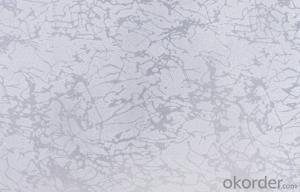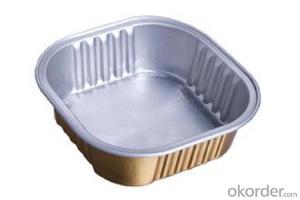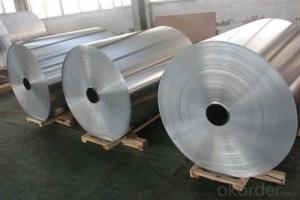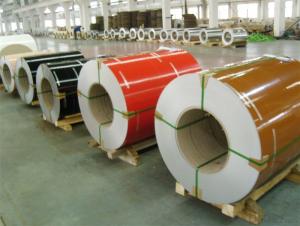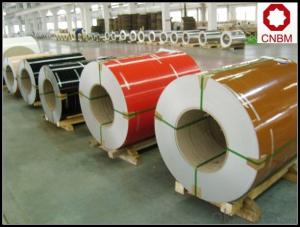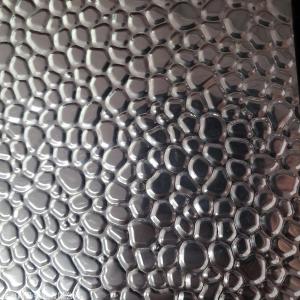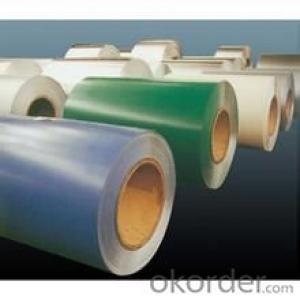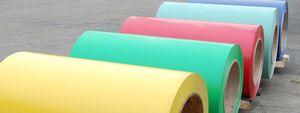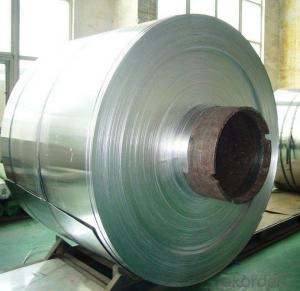Gpc1430h41 Coated Aluminum Coil
- Loading Port:
- China Main Port
- Payment Terms:
- TT OR LC
- Min Order Qty:
- -
- Supply Capability:
- -
OKorder Service Pledge
OKorder Financial Service
You Might Also Like
Product Description:
1 Specifications of PE Coated Aluminum Coil/Sheet
Alloy | AA1050,AA1060, AA1070, AA1100, AA3003, AA3004, AA3005, AA3105, AA5005, AA5052, AA5754, AA5083, AA8011 |
Temper: | H12, H14, H16, H18, H22, H24, H26, H32,HO, F |
Thickness: | 0.10-4.0mm |
Width: | 10mm- 2000mm |
Coating | PE(Polyester) |
Painting Thickness | Standard 16-25 microns, max 40 microns |
Color | Acording to Ral colors or customer’s samples |
Standard: | GB/T17748-1999, ASTM, ISO, EU standard |
Special Specification is available on customer’s requirement | |
Paint Material:PPGI,BECKER, NIPPON.
PE(polyester) Coating
PVDF
2 Usage/Applications of PE Coated Aluminum Coil/Sheet
Our company's PE Coated Aluminum Coil/Sheet have been widely used in the fields of construction and decoration(garage doors, ceiling etc.), electronic appliances, lighting decoration, air-condition air pipe, sanwich panels and drainage, etc.
- Q: What are the fire resistance properties of aluminum coils?
- Aluminum coils have excellent fire resistance properties due to the inherent characteristics of aluminum, such as its high melting point and low flammability. Aluminum does not burn, but instead forms a protective oxide layer on its surface when exposed to heat or flames. This oxide layer serves as a barrier, preventing further oxidation and combustion. Additionally, aluminum has a high thermal conductivity, which helps to dissipate heat quickly, further reducing the risk of fire. Overall, aluminum coils are considered to be highly resistant to fire.
- Q: What are the common sizes and dimensions of aluminum coils?
- Aluminum coils come in various sizes and dimensions, which are determined by the particular industry and application they are used in. While there are common dimensions that are used across different industries, specific requirements may vary. In the building and construction industry, aluminum coils are typically available in widths ranging from 24 inches (609.6 mm) to 60 inches (1524 mm). The thickness of these coils can vary from 0.019 inches (0.48 mm) to 0.032 inches (0.81 mm), although thicker gauges may be available for specialized applications. For the transportation industry, particularly in the manufacturing of automobiles and aircraft, aluminum coils are generally wider and thicker. Widths can range from 48 inches (1219.2 mm) to 72 inches (1828.8 mm), and thicknesses can vary from 0.035 inches (0.89 mm) to 0.125 inches (3.18 mm). In the food and beverage industry, where aluminum is commonly used for packaging purposes, the dimensions of aluminum coils tend to be smaller. Widths can range from 12 inches (304.8 mm) to 24 inches (609.6 mm), and thicknesses are usually around 0.006 inches (0.15 mm) to 0.020 inches (0.51 mm). It is important to keep in mind that these dimensions are not exhaustive and may differ based on the manufacturer and specific requirements of the application. Therefore, it is always advisable to consult with suppliers or manufacturers to determine the most suitable sizes and dimensions for your specific needs.
- Q: What are the elements and compounds that make up an aluminum coil?
- <p>The chemical composition of an aluminum coil is primarily aluminum (Al), which is a lightweight, malleable, and ductile metal. It is usually represented by its elemental symbol 'Al' and has an atomic number of 13. Aluminum is often alloyed with other elements to improve its strength and performance. Common alloying elements include copper (Cu), magnesium (Mg), manganese (Mn), silicon (Si), and zinc (Zn). These elements are added in varying percentages depending on the specific properties required for the aluminum coil's application. The purity of aluminum in a coil can range from 99.00% to 99.7%, with the remainder being trace amounts of other elements.</p>
- Q: What are the different types of surface coatings for aluminum coils?
- There are several types of surface coatings available for aluminum coils, including polyester, polyvinylidene fluoride (PVDF), epoxy, acrylic, and plastisol. Each coating offers unique properties such as durability, weather resistance, chemical resistance, and color retention. The choice of coating depends on the intended application and the specific requirements of the aluminum coil.
- Q: This question asks about the impact of aluminum coils on cooking equipment, including their role in heat distribution and potential benefits or drawbacks.
- <p>Aluminum coils in cooking equipment play a significant role in heat distribution and retention. They are known for their excellent thermal conductivity, which allows for even heat distribution across the cooking surface, reducing hot spots and ensuring consistent cooking results. Aluminum's lightweight and malleability also make it easy to shape into various forms, fitting different types of cookware. However, aluminum can react with acidic foods, potentially altering the taste or releasing small amounts of aluminum into the food, which some studies suggest could have health implications. Additionally, aluminum cookware requires careful handling to avoid scratches that can compromise its performance and appearance.</p>
- Q: Are aluminum coils suitable for heat exchangers?
- Aluminum coils are indeed a fitting choice for heat exchangers. This is because aluminum possesses exceptional thermal conductivity, making it highly efficient and effective in transferring heat between mediums. Its ability to swiftly transfer heat from one medium to another is particularly advantageous for heat exchangers that require efficient heat transfer. Furthermore, aluminum coils are lightweight, resistant to corrosion, and boast excellent durability. These qualities contribute to their popularity in a wide range of applications, including heat exchangers. The corrosion resistance of aluminum ensures that the coils can endure harsh environments and prevent the occurrence of rust or corrosion, thereby prolonging the heat exchanger's lifespan. Moreover, aluminum coils are easily moldable and can be shaped into various forms, allowing for flexibility in designing and constructing heat exchangers. This adaptability makes them suitable for a diverse array of applications, such as HVAC systems, refrigeration units, and automotive cooling systems. In conclusion, the high thermal conductivity, lightweight nature, corrosion resistance, durability, and versatility of aluminum coils make them well-suited for heat exchangers. These properties establish aluminum coils as an excellent choice for achieving efficient heat transfer in numerous industries.
- Q: Are aluminum coils suitable for HVAC ductwork?
- Indeed, HVAC ductwork can be furnished with aluminum coils. The lightweight and corrosion-resistant attributes of aluminum coils render them the preferred choice for HVAC ductwork. These coils possess exceptional durability, enabling them to endure extreme temperatures and weather conditions. Additionally, aluminum coils exhibit remarkable thermal conductivity, facilitating efficient heat transfer and ensuring optimal cooling or heating efficacy. Furthermore, aluminum represents a non-toxic material, guaranteeing the safety of its employment in HVAC systems. All in all, aluminum coils serve as an ideal option for HVAC ductwork, furnishing enduring performance and energy efficiency.
- Q: This question asks for the methods and practices to keep aluminum coil in good condition and prevent damage or corrosion.
- <p>To maintain aluminum coil, follow these steps: Store the coil in a dry, clean environment to prevent moisture and dirt from causing rust. Keep it away from corrosive substances. Regularly inspect the coil for any signs of damage or corrosion, and address any issues promptly. Handle the coil carefully to avoid scratches or dents. Use protective coverings during transportation to prevent damage. Keep records of the coil's condition and maintenance history to track its performance over time. Regular maintenance will help extend the life of the aluminum coil and maintain its quality.</p>
- Q: Can a rolling machine be utilized to transform aluminum coils into flat sheets?
- <p>Yes, you can use a rolling machine to roll aluminum coils into sheets. Rolling machines are specifically designed to apply pressure and reduce the thickness of metal coils, such as aluminum, into thinner, flatter sheets. The process involves passing the aluminum coil through the rolling mill, where it is compressed between rollers. This process can be repeated to achieve the desired thickness and flatness of the aluminum sheet. It's important to ensure the rolling machine is suitable for aluminum and that the appropriate settings are used to avoid damaging the material or the machine.</p>
- Q: This question asks about potential health hazards linked to the use of aluminum coils in culinary settings.
- <p>There are some concerns about using aluminum cookware due to the potential for aluminum to leach into food, especially at high temperatures or in acidic environments. While the human body needs small amounts of aluminum, excessive intake can be harmful. It has been linked to neurological disorders, although the evidence is not conclusive. Most health organizations, including the FDA, consider aluminum cookware safe for general use. However, for those who are concerned, alternatives like stainless steel, cast iron, or non-stick coatings are available. It's always best to follow manufacturer's guidelines and avoid using aluminum cookware for acidic or highly acidic foods to minimize any potential risk.</p>
Send your message to us
Gpc1430h41 Coated Aluminum Coil
- Loading Port:
- China Main Port
- Payment Terms:
- TT OR LC
- Min Order Qty:
- -
- Supply Capability:
- -
OKorder Service Pledge
OKorder Financial Service
Similar products
Hot products
Hot Searches
Related keywords
